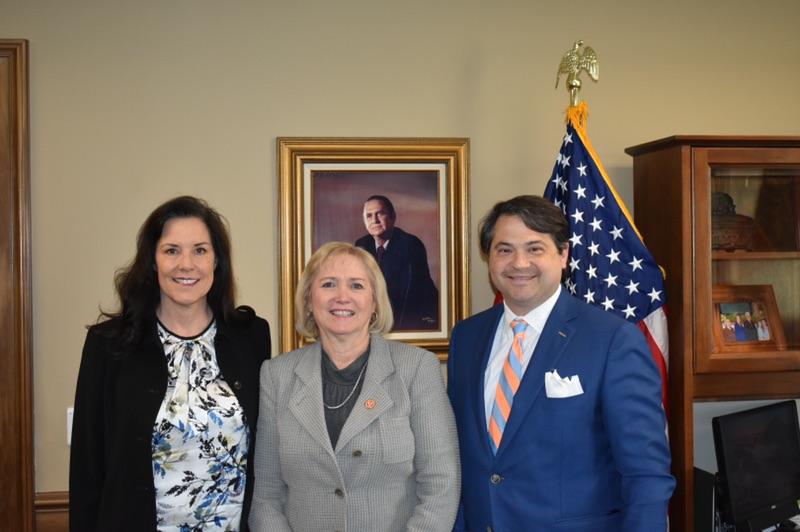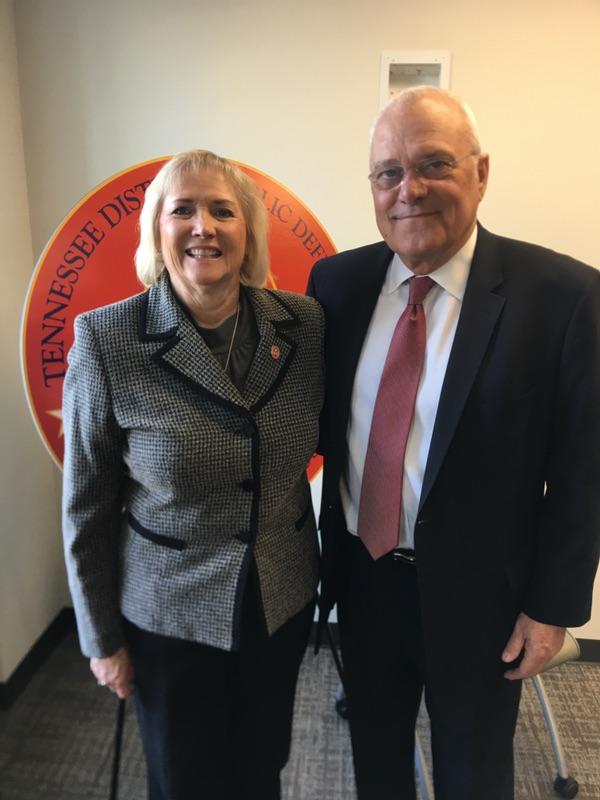
Office of Faith-Based and Community Initiatives seeks to maximize the effectiveness of organizations serving Tennesseans in need
Legislation establishing the Governor’s Office of Faith-Based and Community Initiatives was approved by full Senate this week to maximize the effectiveness of government and private efforts to serve Tennesseans in need. Senate Bill 961 facilitates collaboration between state government and faith-based and community organizations working to improve public safety, reduce addiction, strengthen families and communities, and overcome poverty in the state.
The Office will serve as a single resource for faith-based and community service organizations in the state who wish to be a part of the solution for Tennessee. It will serve as a clearinghouse for organizations to help them work together to best serve Tennesseans in need and identify any available resources that might be available to assist them.”
The Office of Faith-Based and Community Initiatives will operate without cost to the state. It will be structured similar to the Governor’s Books from Birth Foundation, a successful public-private partnership which has distributed over 35 million books to Tennessee children. The governor will select the board of directors and executive director of the nonprofit partner. The nonprofit partner would then work with state government agencies to the extent permitted by law. In order to carry out their responsibilities, the organization would be permitted to accept charitable contributions from the public. Finally, the nonprofit partner will submit an annual report to the General Assembly regarding its operations and accomplishments to ensure accountability.

Tennessee Medical Association Day on the Hill always brings out a big turnout

It was an honor to meet with members of American for Prosperity from Knoxville
Senate Judiciary Committee votes to strengthen Tennessee’s pro-life stance with approval of Human Life Protection Act
The Senate Judiciary Committee voted last week to strengthen Tennessee’s pro-life stance with approval of the Human Life Protection Act. Senate Bill 1257 seeks to proactively trigger the restoration of Tennessee’s abortion law prior to the Roe v. Wade ruling, if and when the power to regulate abortion is returned to the states, to protect the life of unborn children.
When the United States Supreme Court handed down the Roe v. Wade decision in 1973, it rendered Tennessee’s strong abortion law, which prohibited abortion except when the life of the mother was at risk, null and void. Since then, Tennessee Republicans have diligently worked to prevent abortion by initiating a constitutional amendment adopted by Tennessee voters that allowed the General Assembly to enact common-sense restrictions. These restrictions include a 48-hour waiting period and a requirement that abortion facilities be regulated as surgical centers with proper medical professionals on staff. Pro-life efforts also include action to defund Planned Parenthood.
Under this bill, the Attorney General and Reporter would be required to notify the Tennessee Code Commission in the event that Roe v. Wade is overturned or a United States Constitutional amendment is adopted. The Code Commission directs the official compilation of statues, codes and laws of the state. Then thirty days following either event, Tennessee’s abortion law would be restored to its 1972 statute.
The Human Life Protection Act will now proceed to the Senate floor to be voted on by the full Senate. Upon passage, Tennessee would join six other states across the country that have this type of trigger legislation on their books, including Arkansas, Kentucky, Louisiana, Mississippi, North Dakota, and South Dakota. In addition, Missouri, Ohio, Oklahoma and Texas are also currently considering similar legislation.
In other action, the Senate Judiciary Committee voted to send the pro-life “fetal heartbeat bill” to a study committee which will meet this summer to help put the bill in the best posture to withstand a possible constitutional challenge. Senate Bill 1236 bans abortion once a fetal heartbeat has been detected. The committee will meet on August 13th and 14th when members will hear public testimony, with more time provided if needed.
Senate Education Committee approves Education Savings Account legislation providing choice to parents of low income students in the state’s lowest performing schools
Legislation establishing an Education Savings Account (ESA) program to serve low-income students in districts with three or more schools ranked in the bottom 10 percent in achievement was approved by the Senate Education Committee this week. Senate Bill 795, which is part of a package of bills proposed by Governor Bill Lee to improve education opportunities for students, focuses on providing parental choice for students in areas where there are high concentrations of lower-performing schools. Lee has included $25 million in the state’s 2019-2020 budget to pay for the program to ensure there will be no loss of funding for the school district in which the student leaves.
The legislation applies to students in six school districts which meet the criteria, including schools in Shelby County, Knox County, Hamilton County, Metro Nashville, Jackson/ Madison and the state’s Achievement School District (ASD). The ASD is a school system providing academic intervention in schools which perform in the bottom five percent in the state. In addition to being zoned to these districts, qualifying students must have a household income at or below twice the federal guidance to be eligible for free and reduced lunch. They must also be enrolled in a Tennessee school for the previous year or be entering kindergarten.
The amount of the education savings account would vary by district but would be approximately $7,300 per student.
The scholarship program establishes controlled growth caps of 5,000 students in year one, 7,500 in year two, 10,000 in year three, 12,500 in year four, 15,000 in year five, with an ultimate cap of 30,000. Tennessee educates approximately one million students each year. If the caps reach 75 percent of capacity in a year, the legislation allows for an adjustment upward to the next level in the following year. However, if the threshold is not met, the cap will remain stagnant until the limit is reached. A lottery would be held if the caps are fully met, which will have a preference for students who have siblings in the program, are zoned to attend the bottom five percent of schools in the state, and students who are low-income. These students would be served by the program first before others are admitted.
The savings account can be used at category one, two, and three non-public schools which are on the list approved by the Department of Education. Homeschooling is also allowed under the Senate version of the bill.
On accountability, students participating in the program must take the Math and English/Language Arts state tests, so their progress and growth are tracked. Poorly performing schools can be removed from the program by the Tennessee Department of Education. In addition, an annual report on the program’s progress will be generated and reported publicly for greater transparency. Fraud protection measures are also in place under the state’s current Individualized Education Account (IEA) Program, with more protections incorporated in the bill to guard against abuse. IEA is a school choice program enacted in 2015 for eligible students with disabilities which allows parents to choose opportunities which best meets their child’s unique needs.
The bill now goes to the Senate Finance, Ways, and Means Committee. The committee will also hear other proposals by Governor Lee to improve education as the state budget comes before lawmakers in the remaining weeks of the 2019 legislative session. This includes a 2.5 percent pay raise for Tennessee teachers; full funding of the Basic Education Program (BEP); and increased opportunities for students to receive vocational, technical, and agricultural education, as well as dual college credits.

I was pleased to visit with members of the Knoxville Bar Association
In Brief…
Budget – Last week, Senate committees successfully completed 59 hearings to review the individual budgets of all departments and agencies of state government. State senators have been reviewing the budgets since the budget was presented to lawmakers in March. In other budget matters, the Senate Finance, Ways, and Means Committee has received 196 amendments to the appropriations bill before the deadline on Thursday. Attention will now turn to the amendments and to Governor Bill Lee’s supplemental budget appropriation amendment, which will be delivered to the Senate Finance, Ways, and Means Committee on Tuesday. The budget will be the central focus of the General Assembly during the remaining weeks of the 2019 legislative session.
Decoupling / Tax Cuts and Jobs Act — Legislation which ensures that Tennessee businesses are not unintentionally overtaxed due to recent changes in the federal tax code received final approval on Thursday. Tennessee currently uses the definition of federal taxable income as the base for computing a business’s excise tax liability. The Federal Government passed the Tax Cuts and Jobs Act of 2017 which expanded the definition of taxable income and required U.S. corporations to pay taxes on earnings they received from oversea affiliates’ investments. As a result of Tennessee’s excise tax being tied to the federal definition of income, such earnings would be subject to Tennessee’s excise tax.
Senate Bill 558 would decouple two parts of the new federally taxable foreign income from Tennessee’s definition for the purpose of excise tax. These two taxes include the global intangible low-taxed income (GILTI) which is entirely derived from affiliate activities in other countries and the repatriation transition tax which applies to certain foreign corporations that have a U.S. corporation as a shareholder. The bill exempts 95 percent of such income from Tennessee’s excise tax, while the remaining five percent would represent earnings reasonably estimated to be generated domestically. This legislation aims to uphold Tennessee’s business-friendly environment by effectively maintaining the status quo relative to the assessment and collection of the state’s excise tax.
Health Insurance Access / MEWAs — Legislation clarifying the means by which a Multiple Employer Welfare Arrangement (MEWA) is able to determine insurance rates passed the full Senate last Monday. A MEWA is a pool of two or more self-insured employers, in the same profession, who pool resources and contributions in order to provide their employees with healthcare benefits. Senate Bill 942 authorizes MEWAs to use case characteristics, claim experience, health status, or duration of coverage since issuance in determining the initial or adjusted premium rates for such employers pooling their liabilities. This legislation encourages and supports MEWAs as a way for small Tennessee businesses to offer employee benefits outside of the government-run health insurance by sharing risk and costs.
Health Insurance / Tennessee Right to Shop Act – The Senate Commerce and Labor Committee approved legislation establishing the Tennessee Right to Shop Act. Senate Bill 510 seeks to increase transparency to patients by allowing health insurance providers to disclose the cost of healthcare procedures from different in-network providers to patients enrolled in the plan. This legislation seeks to benefit consumers and insurance companies by allowing a patient to choose the lowest cost option for a procedure. The bill will now move to the floor to be approved by the full Senate.
Criminal Justice Reform / Reducing Recidivism – Legislation improving a law passed last year to reduce recidivism through innovative pilot reentry programs has been approved by the Senate Judiciary Committee. Senate Bill 782 revises the definition of recidivism so that outcomes can be measured more effectively for the local jail grant program. The legislation also gives more clarity to who is eligible for grants and ensures there is enough time for the program’s successful completion. Each year, about 5,000 Tennesseans leave Tennessee prisons after serving time for their crimes, with approximately 46 percent reincarcerated within three years. This criminal justice reform program seeks to help these individuals become productive, taxpaying citizens, to keep them from turning back to a life of crime. It also aims to identify and formulate better policies that can be scaled throughout the state.
Convenience Voting Centers – Senate Bill 726, authorizing Rutherford County to continue operation of their “Convenience Voting Center” program to increase voter turnout on Election Day, was approved in the Senate State and Local Government Committee. The successful pilot project allows citizens to vote at any of the county’s 28 polling locations on Election Day most convenient to their work, school, or travel. Convenient locations are generally only provided during the early voting period. The Convenience Voting Centers, also known as Election Day Vote Centers, received great praise from Rutherford County voters last year when a record turnout for a non-presidential year was recorded. Similarly, the committee approved Senate Bill 727, which expands the program to Monroe, Williamson and Wilson Counties upon approval by a supermajority of the county election commission.
Tennessee Sports Gaming Act – Legislation to legalize online sports betting, known as the Tennessee Sports Gaming Act, passed the Senate State and Local Government Committee. Senate Bill 16 creates the Lottery Corporation Gaming Advisory Council, which would oversee and promulgate rules and regulations in accordance with robust regulatory provisions laid out in the bill. The Advisory Council would consist of nine members; the Senate Speaker, House Speaker and Governor would each appoint three members. In 2018, the United States Supreme Court repealed the Professional and Amateur Sports Protection Act through its ruling in Murphy v. NCAA. This repeal gave the states the authority to regulate sports betting, prompting ten states to take action. It is currently not regulated in the State of Tennessee, but a large number of Tennesseans are already participating in sports betting on an off shore betting site, with no tax dollars being collected for the state. Upon passage, the Fiscal Review Committee estimates that online sports betting will amount to $50 million in revenue by the second year of enactment. The bill will now move to the Senate Finance, Ways and Means Committee.
Death Penalty / Fentanyl — The Senate Judiciary Committee voted to strengthen Tennessee’s death penalty law as it affects offenders who knowingly sell or distribute the most dangerous drugs, including fentanyl, with the intent and premeditation to commit murder. Senate Bill 1368 adds an aggravating circumstance for the imposition of the death penalty or life without the possibility of parole if the defendant knowingly sold or distributed a substance containing fentanyl, carfentanil, or other Schedule II controlled substances. The bill now goes to the Senate floor for final consideration.
Elected Officials / Ineligibility for Holding Office – The Senate gave final approval this week to legislation ensuring that an elected official who is convicted of an infamous crime committed while in their official capacity cannot run for office again. Senate Bill 731 closes a loophole in current law by forever disqualifying the person from holding office, regardless of any plea agreement or diversion process. The legislation is in keeping with the General Assembly’s previous actions to deal strongly with office holders who violate the public trust.
Tennessee Employees / Park Rangers — The full Senate approved Senate Bill 1482 extending health insurance benefits for two years to the families of park rangers killed in the line of duty. Health insurance benefits are already available to the surviving spouse and children of capitol police officers, Tennessee Highway Patrol, Tennessee Bureau of Investigation, and Tennessee Wildlife Resource Agency.
Veterans — Two bills endorsed by the General Assembly’s Veterans’ Caucus advanced in the Senate this week. One bill approved by the full Senate increases the discount that disabled veterans receive at state parks. Currently, veterans get a 25 percent discount during the in season and a 50 percent discount in the off season in Tennessee state parks. Senate Bill 1119 gives 100 percent permanent and total service-connected disabled veterans a 50 percent discounted rate during all seasons at state parks. In order to receive the discount, such individuals will be required to provide certification of that status. The legislation now awaits approval from the House.
The second bill seeking to support and protect Tennessee veterans requires the Department of Veterans Services (DVS) to provide training in suicide prevention to their employees who directly interact with veterans. The training is available free of charge to DVS through suicide prevention networks and can be viewed in a few hours. Senate Bill 673 will prepare and arm DVS employees with prevention measures while responding to veterans in crisis.
Medical Cannabis – Legislation that would have allowed Tennesseans to receive medical cannabis under the care of a physician and pharmacist was deferred until 2020. Senate Bill 572 would have allowed patients with certain conditions to obtain a state-issued medical cannabis card which they could take to an Agricultural Medical Center staffed by pharmacists to receive a monthly dose. Sponsors will continue their work in finding consensus on the legislation over the summer and fall months.

Rep. Jerome Moon and I joined President Anthony Wise and Board members of Pellissippi State at the SOAR Awards Banquet

I enjoyed my visit with Rhonda Campbell Clay, March of Dimes

Ellie Kittrell stopped by and updated me on the great things happening at The Muse

Knox County Public Defender, Mark Stephens, stopped by for a visit.

I enjoyed visiting with Dr. Bob Elder when he was serving as the Doctor of the Day
For information on State Senators including phone numbers and email addresses, click Tennessee State Senators.
For House members, click Tennessee House Members
For all other information on the General Assembly including legislation, schedules and videos, click Tennessee General Assembly
As always thank you for continued support!
Sincerely,
Becky Massey
District 6 Senator
615-741-1648.
